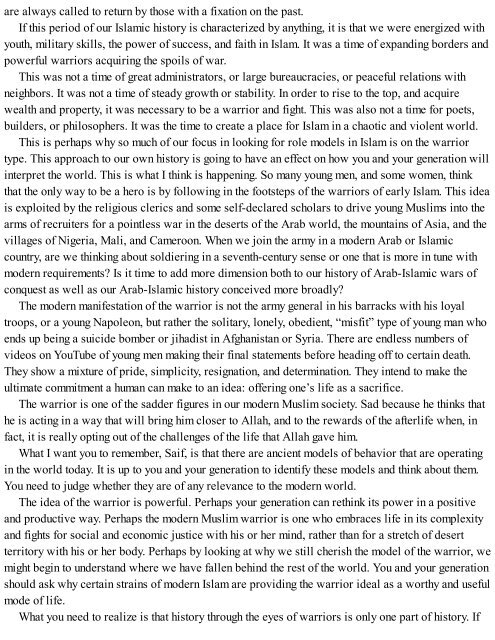1250119847
You also want an ePaper? Increase the reach of your titles
YUMPU automatically turns print PDFs into web optimized ePapers that Google loves.
are always called to return by those with a fixation on the past.<br />
If this period of our Islamic history is characterized by anything, it is that we were energized with<br />
youth, military skills, the power of success, and faith in Islam. It was a time of expanding borders and<br />
powerful warriors acquiring the spoils of war.<br />
This was not a time of great administrators, or large bureaucracies, or peaceful relations with<br />
neighbors. It was not a time of steady growth or stability. In order to rise to the top, and acquire<br />
wealth and property, it was necessary to be a warrior and fight. This was also not a time for poets,<br />
builders, or philosophers. It was the time to create a place for Islam in a chaotic and violent world.<br />
This is perhaps why so much of our focus in looking for role models in Islam is on the warrior<br />
type. This approach to our own history is going to have an effect on how you and your generation will<br />
interpret the world. This is what I think is happening. So many young men, and some women, think<br />
that the only way to be a hero is by following in the footsteps of the warriors of early Islam. This idea<br />
is exploited by the religious clerics and some self-declared scholars to drive young Muslims into the<br />
arms of recruiters for a pointless war in the deserts of the Arab world, the mountains of Asia, and the<br />
villages of Nigeria, Mali, and Cameroon. When we join the army in a modern Arab or Islamic<br />
country, are we thinking about soldiering in a seventh-century sense or one that is more in tune with<br />
modern requirements? Is it time to add more dimension both to our history of Arab-Islamic wars of<br />
conquest as well as our Arab-Islamic history conceived more broadly?<br />
The modern manifestation of the warrior is not the army general in his barracks with his loyal<br />
troops, or a young Napoleon, but rather the solitary, lonely, obedient, “misfit” type of young man who<br />
ends up being a suicide bomber or jihadist in Afghanistan or Syria. There are endless numbers of<br />
videos on YouTube of young men making their final statements before heading off to certain death.<br />
They show a mixture of pride, simplicity, resignation, and determination. They intend to make the<br />
ultimate commitment a human can make to an idea: offering one’s life as a sacrifice.<br />
The warrior is one of the sadder figures in our modern Muslim society. Sad because he thinks that<br />
he is acting in a way that will bring him closer to Allah, and to the rewards of the afterlife when, in<br />
fact, it is really opting out of the challenges of the life that Allah gave him.<br />
What I want you to remember, Saif, is that there are ancient models of behavior that are operating<br />
in the world today. It is up to you and your generation to identify these models and think about them.<br />
You need to judge whether they are of any relevance to the modern world.<br />
The idea of the warrior is powerful. Perhaps your generation can rethink its power in a positive<br />
and productive way. Perhaps the modern Muslim warrior is one who embraces life in its complexity<br />
and fights for social and economic justice with his or her mind, rather than for a stretch of desert<br />
territory with his or her body. Perhaps by looking at why we still cherish the model of the warrior, we<br />
might begin to understand where we have fallen behind the rest of the world. You and your generation<br />
should ask why certain strains of modern Islam are providing the warrior ideal as a worthy and useful<br />
mode of life.<br />
What you need to realize is that history through the eyes of warriors is only one part of history. If
















